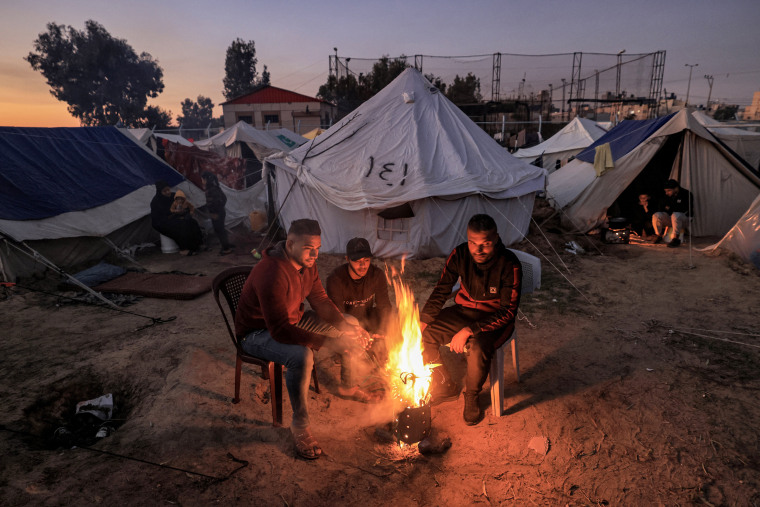TEL AVIV — Tragedy envelops Gaza and its people.
Despite the catastrophic war that has killed thousands of his fellow residents, Nawaf Muttar says he would never leave the enclave even if he had the chance.
“I cannot go to Sinai,” he told NBC News’ crew on the ground, referring to the arid Egyptian peninsula bordering Gaza to the south. “Neither I nor my family nor anyone I know wants to go there.”
The war, precipitated by the Oct. 7 Hamas terror attacks that killed some 1,200 people and resulted in the kidnapping of some 240 people in Israel, according to Israeli officials has also killed more than 21,000 people in Gaza, according to the Palestinian Health Ministry. More than 100 of those kidnapped are believed to remain in captivity.
Meanwhile, Israeli airstrikes and ground operations have leveled entire neighborhoods, displaced an estimated 90% of the enclave’s residents and plunged an estimated 1 million into hunger and starvation, according to the World Health Organization. Residents have been ordered to leave crowded, urban refugee camps as Israel announced it was expanding its ground offensive into what it called “a new battle zone.”
The mass displacement has pushed thousands of Palestinians like Muttar and his family into Rafah and other areas bordering Egypt. It has also fueled worries that civilians will be forcibly displaced into Egypt, imperiling the Palestinian cause, which for many is the long-cherished vision of an internationally recognized independent Palestinian state, partly in Gaza.
“Do we abandon the dreams of our ancestors?” Muttar said.
If they are forced to cross the border to flee the bombing, hunger and chaos, many fear the possibility of a new “Nakba,” the Arabic word for “catastrophe” used to describe the displacement of some 700,000 Palestinians who were expelled from their land in what became Israel in 1948.
Muttar says his immediate priority is to stay in the place he calls home.
“Where will we go? To Gaza, of course,” he said. “I will not leave my place under any circumstances.”
Several others expressed similar sentiments, saying they would rather face Israel’s bombardment than leave the devastated strip of land.
“Of course, I will stay in Gaza,” Khairiya Al-Arja said.
“No matter how intense the war gets, we will remain in Gaza,” she said. “We will remain steadfast until our last breath.”
Gaza’s population swelled during the sweeping displacement brought on by the 1948 Arab-Israeli war and around 70% of Palestinians in Gaza today call the enclave their home as a result of that forced exodus, said Khaled Elgindy, senior fellow at the Middle East Institute.
And for many, to be uprooted again, would mark a second catastrophe, said Elgindy, who directs the Program on Palestine and Palestinian-Israeli Affairs at the think tank in Washington.
“They heard the stories from their parents and grandparents and now they’re living it, that same experience,” he said. “And that’s another generational trauma that will be passed on to the next generation, particularly if this gets worse and we actually see them pushed over the border into Egypt.”

The leaders of neighboring countries, King Abdullah of Jordan and Egyptian President Abdel Fattah el-Sissi, on Wednesday also rejected any Israeli efforts to expel Palestinians in Gaza and the occupied West Bank, according to state media.
But while some Palestinians say they are determined to stay put, no matter what, others say that after months of bombardment and fighting, they feel defeated.
“As for me, I want to leave Gaza, God willing,” Ahmed Essam said.
“For 70 years, we have been living under siege, and four wars have taken place, and every time we lost martyrs, and our homes are destroyed,” he said. “But this war is very fierce, this war has devoured everything.”
Elgindy said he believed that as the war goes on, more people in Gaza will feel pressed to flee.
“Initially Palestinians were saying ‘We’re not leaving, we’re never gonna leave,’ but obviously, I mean, people don’t want to starve to death. So, I think it’s gone, in my mind, from being possible to probable,” he said.
In addition to a mounting death toll, much of the enclave has faced a spiraling health crisis, with access to food, clean drinking water and medical supplies dwindling. Meanwhile, homes, public buildings and landmarks have also been leveled. According to the United Nations, around 60% of the enclave’s infrastructure has been destroyed in Israel’s offensive.
Even before this latest war, sanctions imposed after Hamas’ 2006 election victory and violent takeover of the strip effectively crippled its economy.
Tensions and violence have repeatedly flared in the years since this decadeslong conflict began. The enclave fell under Egyptian rule following the 1948 Arab-Israeli war until it was occupied by Israel years later during the 1967 Six-Day War.
Israel unilaterally withdraw from the enclave in 2005, and not long after, Hamas gained control after winning elections in 2006.
‘Gaza Nakba 2023’
Calls from a number of far-right Israeli politicians for the mass displacement of Palestinians into Egypt’s Sinai Desert or to other countries have deepened fears of a new Nakba.
A paper by an Israeli government ministry proposing that Palestinians in Gaza could be transferred to Egypt’s Sinai Desert sparked an outcry over the possibility of forced displacement. Meanwhile, ministers within Israel’s government have made similar suggestions.
Last month, Agriculture Minister Avi Dichter told Israeli Channel 12 that the war would be Gaza’s “Nakba,” later saying: “Gaza Nakba 2023. That’s how it’ll end.”
A week before Dichter’s comments, Israeli Heritage Minister Amihai Eliyahu drew condemnation after suggesting that dropping a nuclear bomb on the Gaza Strip was “one of the possibilities” in the conflict.


